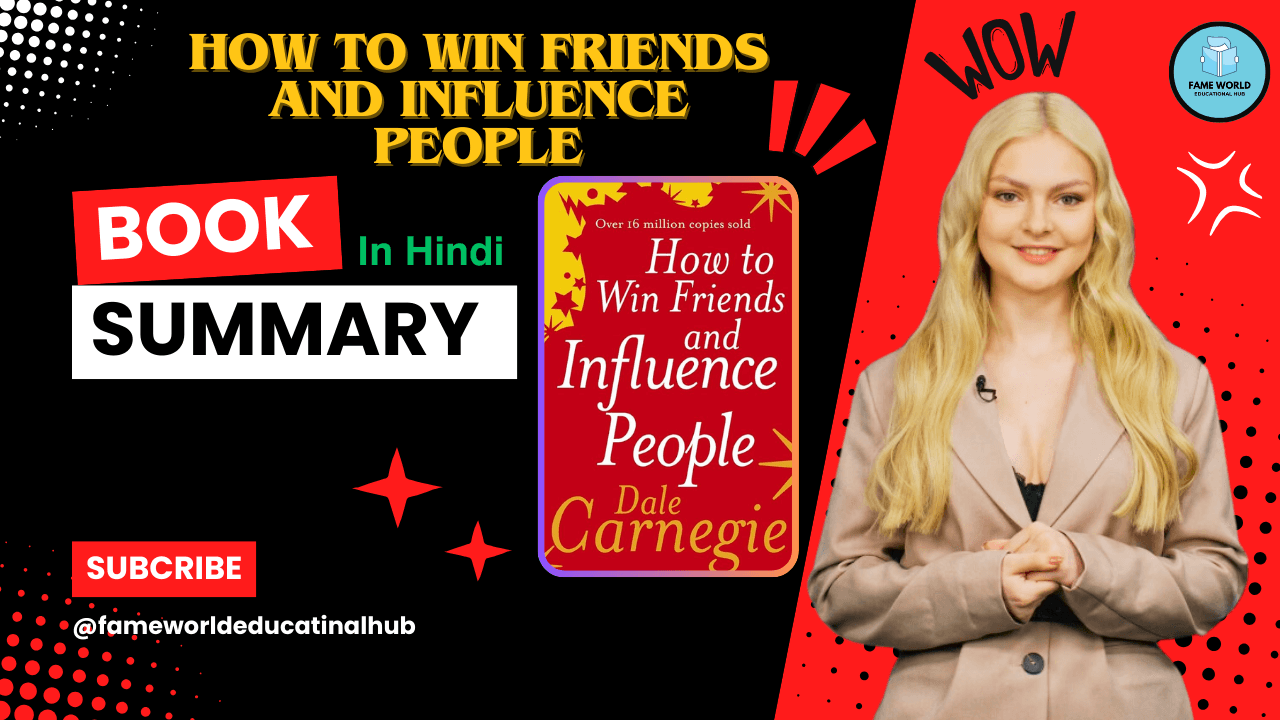“How to Win Friends and Influence People” by Dale Carnegie is one of the most influential self-help books ever written. First published in 1936, it has sold over 30 million copies worldwide, proving its timeless relevance. This book provides practical advice on improving social interactions, building meaningful relationships, and becoming a more influential person in both personal and professional contexts.
Overview of the Book
Dale Carnegie’s book is broken into several key sections, each focused on a fundamental principle of human relations. Let’s explore the main ideas and takeaways from this classic:
Part 1: Fundamental Techniques in Handling People
In this section, Carnegie introduces the foundational techniques for improving interpersonal skills:
Don’t Criticize, Condemn, or Complain
Criticism often leads to resentment, and it rarely leads to positive behavior changes. Instead, Carnegie advises understanding others’ perspectives and avoiding blame.
Give Honest and Sincere Appreciation
Everyone craves appreciation. Carnegie emphasizes that genuine praise and appreciation are essential for building rapport and relationships.
Arouse in the Other Person an Eager Want
To influence people, focus on what they want, not what you want. When you align your desires with others’ interests, cooperation becomes more natural.
Part 2: Six Ways to Make People Like You
Carnegie outlines simple yet effective ways to win people’s affection:
Become Genuinely Interested in Other People
Showing sincere interest in others is key to building meaningful connections.
Smile
A smile is a universal sign of friendliness and positivity. Carnegie emphasizes its power in creating a welcoming atmosphere.
Remember That a Person’s Name is the Sweetest Sound
Addressing someone by their name is a powerful way to show that they matter to you.
Be a Good Listener and Encourage Others to Talk About Themselves
Listening is an underappreciated skill. Let others share their thoughts, and they will feel valued.
Talk in Terms of the Other Person’s Interests
Tailor conversations to what excites or matters to the other person, and they will feel more connected to you.
Make the Other Person Feel Important
Everyone likes to feel significant. Carnegie advises offering sincere compliments and making others feel valued.
Part 3: How to Win People to Your Way of Thinking
This section focuses on influencing others without causing resentment or resistance:
Avoid Arguments
Carnegie argues that no one wins an argument. Instead, aim for constructive dialogue.
Show Respect for Others’ Opinions
Even if you disagree, respect the opinions of others. Dismissing someone’s perspective only creates defensiveness.
If You’re Wrong, Admit It Quickly and Emphatically
Owning up to mistakes builds trust and shows humility, making you more likable and trustworthy.
Begin in a Friendly Way
Starting a conversation with warmth sets a positive tone for a discussion, even when addressing conflicts.
Let the Other Person Feel That the Idea Is Theirs
People are more committed to ideas they believe they came up with. Guide others to your perspective while letting them feel ownership of the thought.
Part 4: Be a Leader: How to Change People Without Giving Offense or Arousing Resentment
In the final section, Carnegie provides principles for leading others without creating negativity:
Begin with Praise and Honest Appreciation
Starting with positive feedback softens the delivery of criticism and makes it easier for people to accept suggestions.
Call Attention to People’s Mistakes Indirectly
Rather than bluntly pointing out faults, gently guide someone toward recognizing their own mistakes.
Talk About Your Own Mistakes Before Criticizing Others
By admitting your own flaws first, you create an environment of mutual understanding.
Ask Questions Instead of Giving Direct Orders
Asking questions rather than dictating can make the other person feel empowered and more willing to cooperate.
Why This Book Matters Today
Though written nearly a century ago, “How to Win Friends and Influence People” is still incredibly relevant in today’s fast-paced, digital world. The principles Carnegie outlines are timeless because they focus on universal truths about human nature. Whether you’re looking to build stronger personal relationships, enhance your career prospects, or become a better leader, this book offers a blueprint for success.
How You Can Apply These Principles in Your Life
- Improve Workplace Relationships: Use Carnegie’s techniques to foster cooperation, avoid conflicts, and build camaraderie with colleagues.
- Enhance Personal Connections: Apply the “Six Ways to Make People Like You” to strengthen friendships and family ties.
- Become an Influential Leader: If you’re in a leadership role, Carnegie’s advice on motivating and inspiring others can help you lead with empathy and effectiveness.
Watch the Video for More Insights!
For more in-depth information and tips on how to apply the book’s principles in real life, watch this video on How to Win Friends and Influence People.
Get Your Copy of the Book
If you want to dive deeper into these principles, I highly recommend getting your hands on a copy of “How to Win Friends and Influence People”. You can purchase the book through this link.
Whether you’re seeking to build better relationships or looking to increase your influence in any area of life, Dale Carnegie’s timeless wisdom is an invaluable resource. His practical advice can help you navigate personal and professional challenges with greater ease, turning obstacles into opportunities for connection and growth.
Start implementing these principles today, and see how they transform your interactions!



